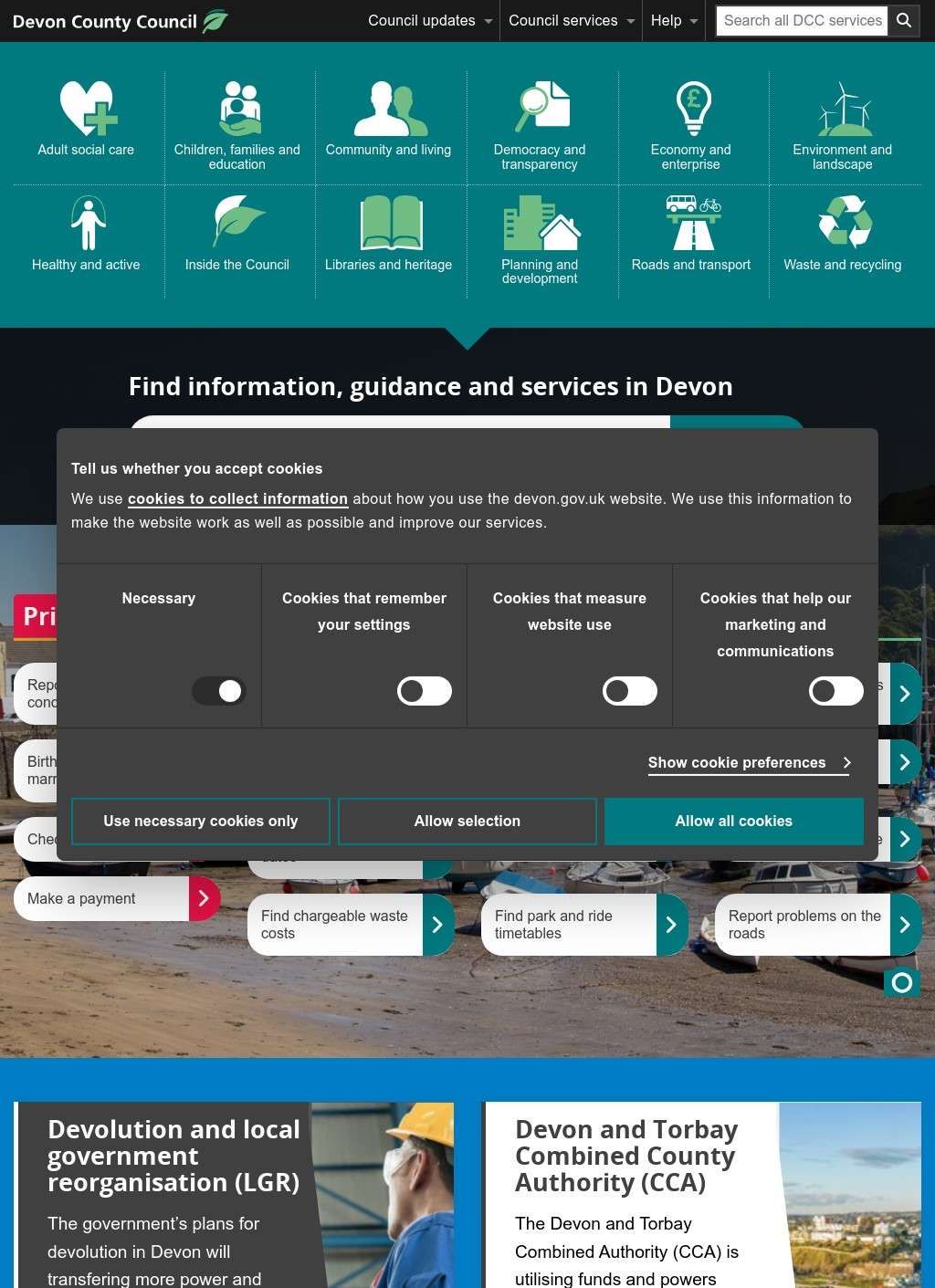Devon County Council stands as the principal administrative body for one of England's largest counties, serving over 800,000 residents across a sprawling 2,590 square miles. Based at County Hall in Exeter, this authority manages everything from pothole repairs on country lanes to complex social care arrangements for vulnerable adults. The council's reach extends into nearly every aspect of daily life for Devon residents, whether they're applying for a Blue Badge, checking school term dates, or reporting fly-tipping on a rural road.
The council's responsibilities read like a checklist of modern civic life. They oversee 365 schools, maintain 7,373 miles of roads (the longest minor road network of any UK local authority), and run 50 libraries scattered across market towns and villages. Their social services teams support thousands of children and families, while adult care services help elderly residents maintain independence in their own homes. It's a massive operation that employs over 20,000 people, making it Devon's largest employer.
What sets Devon County Council apart is their approach to digital services. Their website acts as a comprehensive portal where residents can accomplish dozens of tasks without ever picking up the phone. Need a parking permit for your van? Apply online. Want to appeal that parking ticket from Exeter city centre? The system handles it. School admissions, waste centre bookings, and highway fault reporting all happen through their digital platform, which processes thousands of transactions weekly.
Recent developments have thrust the council into new territory with the formation of the Devon and Torbay Combined County Authority. This arrangement, part of the government's devolution agenda, promises to shift more decision-making power from Westminster to local communities. The CCA brings together Devon County Council with Torbay Council to tackle regional challenges around transport, skills training, and economic development. Early projects include improvements to rural bus services and investment in green energy infrastructure.
The council's waste and recycling operations deserve particular mention. They manage 19 household waste recycling centres across the county, from Barnstaple in the north to Ivybridge in the south. These centres accept everything from garden waste to old fridges, with some materials incurring charges. Their van permit system ensures commercial waste doesn't overwhelm facilities meant for household use. During peak summer months, these centres handle massive volumes as tourists and second-home owners clear out properties.
Education remains a core function, with the council responsible for school transport, special educational needs provision, and maintaining school buildings. They coordinate admissions for all state schools in Devon, managing the annual scramble for places that sees thousands of applications processed each spring. Their education team also oversees standards in schools, working with headteachers to improve outcomes for Devon's children. The county faces unique challenges with many small rural schools struggling to remain viable as pupil numbers decline.
Social care represents the council's largest budget commitment, consuming over half of all spending. Teams of social workers, occupational therapists, and care coordinators work across the county supporting families in crisis, protecting vulnerable children, and helping adults with disabilities live fulfilling lives. The council commissions services from hundreds of care providers, from residential homes to domiciliary care agencies visiting people at home.
Looking at their community engagement, the council maintains strong connections with Devon's 400-plus parish and town councils. These smaller authorities handle local issues like village halls and play areas, while the county council provides strategic leadership and funding. Regular consultations seek public input on everything from library opening hours to new cycling routes. Their headquarters at County Hall welcomes visitors seeking information or attending public meetings.
Trading standards forms another vital service, protecting consumers from rogue traders and ensuring businesses play fair. Their officers investigate everything from counterfeit goods at car boot sales to complex financial scams targeting elderly residents. Animal health work sees them licensing pet shops, monitoring livestock movements, and responding to disease outbreaks on farms. During the 2001 foot-and-mouth crisis, their teams worked round the clock coordinating Devon's response.
The council's highway maintenance programme tackles the perpetual challenge of keeping Devon's vast road network in decent condition. Winter gritting operations protect major routes when temperatures plummet, while summer sees crews repairing surfaces damaged by freeze-thaw cycles. Their online reporting system allows residents to flag potholes, broken streetlights, and blocked drains, with teams prioritising repairs based on safety risks. Rural roads present particular difficulties, with narrow lanes and high hedges making maintenance work challenging.
Financial pressures continue to shape service delivery, with the council making difficult choices about spending priorities. Rising demand for social care, coupled with reduced government funding, means other services face cuts. Libraries have reduced hours, some children's centres have closed, and road maintenance backlogs grow longer each year. The council publishes detailed budget information online, showing residents exactly where their council tax goes. Public consultations help shape these difficult decisions, though satisfying everyone proves impossible when resources remain stretched.
